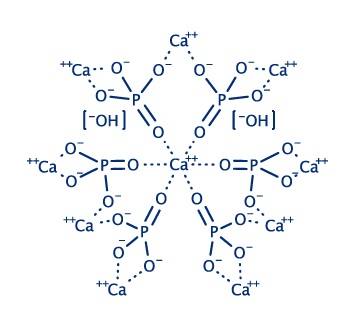Calcium is a critical mineral for bone, hormonal, muscular, nervous system, and metabolic health.

Calcium can also improve thyroid health, calm the stress response, help avoid osteoporosis and facilitate nervous system & muscular function.
Folks with hypothyroidism, women, and the elderly especially need calcium — although supplementation should be done cautiously and wisely.
If digestible, dairy is a fine source of calcium, but many can’t properly digest dairy. On the other hand, non-dairy products are usually supplemented with forms of calcium that are poorly absorbed.
Similarly, plant-based food sources of calcium are largely full of anti-nutrients that can render calcium less absorbable.
For those with certain digestive problems, eating lots of greens may be undesirable — due to insoluble fiber, goitrogens, lectins or oxalates.
However, there are many supplemental forms of calcium, but they’re not created equal. Let’s explore the best calcium supplements.
1
Calcium Hydroxyapatite
Calcium hydroxyapatite is a unique form of calcium that everyone needs to be aware of.

Over 99% of body calcium is found as calcium hydroxyapatite — and it’s a superior source of supplemental calcium.
I have found calcium hydroxyapatite to be less constipating than other forms (perhaps due to the presence of other minerals and/or better absorption).
Calcium hydroxyapate also contains trace amounts of other minerals, and this will encourage quicker assimilation when you supplement. Instead of having to recruit these minerals already occurring in the body, these trace minerals are already present, streamlining the process. This becomes more important in sicker folks and the elderly.
PROs:
- A natural, biologically-active form
- The presence of other minerals in small amounts improves facilitation of calcium
- Less constipating than other forms
CONs:
- All calcium supplements can cause constipation (though this product is superior for this).
RATING: 9.5/10
2
Calcium Citrate
Calcium Citrate has been a leading supplemental form of calcium for some time due to its superior absorption rate and gentle nature on the stomach.
However, there are some concerns that citric acid can 1) irritate the gut, 2) interfere with the Krebs cycle at moderate doses, or 3) cause an allergic reaction due to how citric acid is manufactured; it’s manufactured by the fermentation of starch by several types of mold (candida and aspergillus niger, in particular).
PROs:
- High absorbability
- Improved absorption on an empty stomach
CONs:
- Citric acid may be an issue for some
RATING: 7.5/10
This product has a tiny amount of fat-soluble Vitamin C that won’t interfere with your observations and could promote the utilization of the calcium.
3
Bone Meal Powder
Bone Meal Powder is a calcium source derived directly from cattle bones. Perhaps surprisingly, powdered bovine bones make for a superior source of calcium.
Why? Because the calcium found in bone meal is calcium hydroxyapatite — a superior source of calcium. The hydroxyapatite molecule provides cofactors supporting calcium’s role in the body. It’s also more absorbable.
PROs:
- A cheaper form of hydroxyapatite calcium
- Somewhat gentle on the stomach
- Provides a small number of other minerals that support bone formation and metabolism
CONs:
- All supplemental calcium can cause constipation
- Difficult to find in pill form
- Potential heavy metal contamination. Just like with bone broth and collagen, there are minor concerns about heavy metal content in bone meal. Modern companies claim to test for heavy metals — but are you willing to trust them? I do use this product from time to time, but I don’t depend on it solely.
RATING: 8/10
4
Calcium Carbonate
Calcium Carbonate is the most common form of calcium. It’s highly prevalent in rocks and is used to make chalk. People commonly use it in homemade and commercial toothpaste.
Calcium carbonate is difficult to absorb and hard on the stomach. Calcium carbonate’s best quality? It’s very cheap.
I personally find calcium carbonate to be quite absorbable in small doses, but larger doses do not sit as well in the gut.
PROs:
- Cheap
- Pure
- Non-allergenic
CONs:
- Not very absorbable
- Harder on the digestive system
RATING: 4/10
5
Coral Calcium
Coral Calcium is simply calcium carbonate (again, the most common form of calcium) with a small amount of trace minerals included.
These products often seem to describe the coral source as providing these extra nutrients, but in fact, these extra nutrients are added by the manufacturer. This makes these products a supplement blend.
These added nutrients are often of lower quality. Worse, you need to take important nutrients like calcium in isolation so you can perceive any positive or negative effects about the dosages.
One glaring nutrient added to many coral calcium brands is magnesium oxide, which is an inferior source of magnesium.
This magnesium (oxide) ostensibly added to make the coral’s calcium carbonate (the same calcium as eggshell calcium, and rocks) less constipating in the gut.
Nevertheless, there’s at least one big coral calcium brands will try and twist the science and suggest that magnesium oxide is actually MORE absorbable than other forms.
It only takes a few weeks of experimentation for most people to see this is not the case: magnesium oxide is most effective as a laxative, not as a source of magnesium, and its inclusion into any coral calcium product is most likely to combat the effects of the highly-constipating calcium carbonate.
PROs:
- May have a tiny amount of trace minerals
CONs:
- It’s mostly calcium carbonate
- Most coral calcium products are blends with many added ingredients
- Added ingredients are often inferior
RATING: 4/10
I have not found a coral calcium supplement that I like.
6
(Homemade) Eggshell Calcium
Eggshells are essentially — and almost entirely — calcium carbonate with a tiny amount of other minerals (just like coral calcium).
Among people who cannot tolerate dairy, it is common for some to make their own eggshell calcium powder by grinding eggshells in a coffee grinder. I do not recommend this.
PROs:
- It’s fun to make things yourself
- Pure — if you trust the source of your eggshells
- Calcium carbonate may be less irritating than citric acid-based calcium (in a very small number of people)
CONs:
- Low absorbability
- Higher rate of constipation







